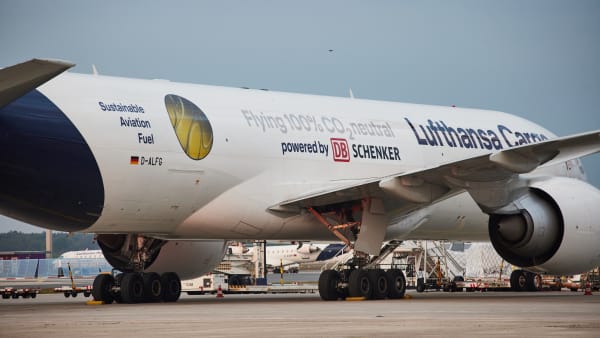Archives
Air
CO2-free en route
[ May 27, 2021 // Gary G Burrows ]The Lufthansa Cargo freighter with the registration D-ALFG took flight on May 20 for the first time with a very special design: The lettering “Flying 100% CO2 neutral powered by DB Schenker” and an illustration of Sustainable Aviation Fuel (SAF) highlight the joint mission of Lufthansa Cargo and DB Schenker.
Both companies have been working together on climate protection for ten years and have now been able to launch a concrete offer on the market. With the use of SAF, which is based on extensive research, the cargo airline and the logistics service provider are accelerating the move away from fossil fuels in order to make the entire air freight industry more climate-friendly. Since April, they have been offering weekly, CO2-neutral cargo rotations between Frankfurt and Shanghai. The aircraft’s special livery draws attention to the issue of SAF and invites customers to transport their freight in a CO2-neutral manner. For Deutsche Bahn and DB Schenker, this is only the third time that the company logo has appeared on an aircraft.
“We are delighted to have DB Schenker at our side, a partner who is so energetically promoting the reduction of CO2 in the air freight industry. The special livery gives us the opportunity to draw attention to our joint commitment worldwide. It also shows that we take our support of the United Nations’ ‘Climate Action’ Goal very seriously. The increased use of Sustainable Aviation Fuel and a modern freighter fleet are measures with a great impact to sustainably reduce our CO2 emissions,” explains Ashwin Bhat, Lufthansa Cargo Chief Commercial Officer.
Following the first CO2-neutral freighter rotation by Lufthansa Cargo and DB Schenker from Frankfurt to Shanghai in November 2020, the companies offer a 100% greenhouse gas-neutral freight connection between Europe and Asia throughout the entire Lufthansa Cargo summer flight schedule. The fuel requirement on the Frankfurt-Shanghai route and back will be covered entirely by SAF. This will save around 174 tonnes of conventional kerosene every week.
Sustainable Aviation Fuel is produced primarily from biomass waste, for example from used vegetable and cooking oils. During combustion in the engine, therefore, only CO2 is released which was previously removed from the atmosphere during the growth of the plants. The greenhouse gases produced during the production and transport of the fuel are also fully compensated for with certified offset projects. This ensures the complete greenhouse gas neutrality of the flights.

Tags: DB Schenker, Lufthansa Cargo







